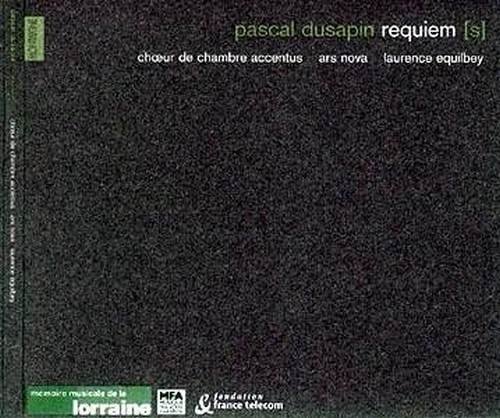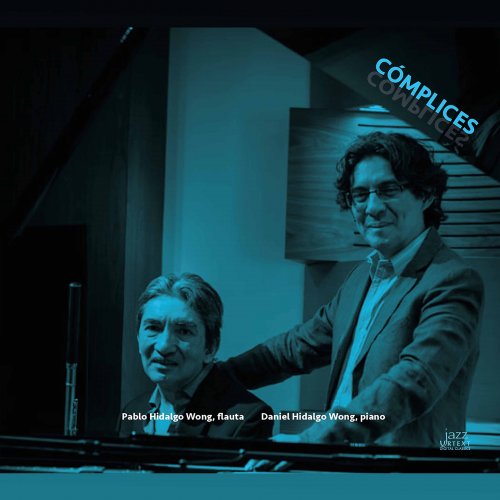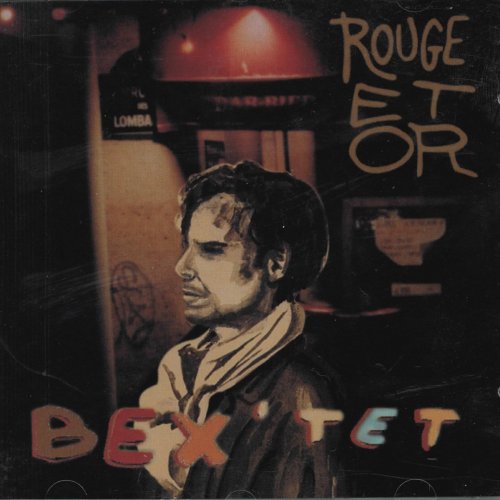Chamber Choral Accentus, Laurence Equilbey - Pascal Dusapin - Requiem[s] (2000)

Artist: Chamber Choral Accentus, Laurence Equilbey
Title: Pascal Dusapin - Requiem[s]
Year Of Release: 2000
Label: Montaigne
Genre: Classical, Choral
Quality: FLAC (image+.cue,log)
Total Time: 47:10
Total Size: 170 Mb
WebSite: Album Preview
Tracklist: Title: Pascal Dusapin - Requiem[s]
Year Of Release: 2000
Label: Montaigne
Genre: Classical, Choral
Quality: FLAC (image+.cue,log)
Total Time: 47:10
Total Size: 170 Mb
WebSite: Album Preview
1. Granum Sinapis : I. Au commencement
2. Granum Sinapis : II. Des deux un fleuve
3. Granum Sinapis : III. Des trois la boucle
4. Granum Sinapis : IV. Ce point est la montagne
5. Granum Sinapis : V. Ce désert est le bien
6. Granum Sinapis : VI. C'est lumière, c'est clarté
7. Granum Sinapis : VII. Deviens tel un enfant
8. Granum Sinapis : VIII. O mon âme
9. Umbrae mortis
10. Dona eis : Introit
11. Dona eis : Graduale
12. Dona eis : Tractus & Offertorium
13. Dona eis : Dona
14. Dona eis : Sanctus & Libera me
15. Dona eis : Umbrae
Performers:
Chamber Choral Accentus, direction Laurence Equilbey, with:
Soprano (Granum Sinapis) : Kaoli Isshiki
Soprano (Dona Eis) : Solange Anorga
Ensemble instrumental (Dona Eis) : Ars Nova
Pascal Dusapin (b. 1955) is undoubtedly a significant contemporary composer of the middle generation, but one whom I have found problematic. His opera Romeo & Juliette was featured at Huddersfield, but left me cold and bemused, as did the CD, which I passed on to a grateful fan of the composer! I had reservations about his new piano Études played (twice over) last month at Musica 2000 in Strasbourg, where he is composer in residence. I am therefore grateful to pianist Ian Pace, who played two of them there, for permission to reprint excerpts from his most recent writing about Dusapin from the Strasbourg programme book.
This new CD of his three works for mixed choir (the first two a cappella, the third with seven wind instruments) may be a way in, and is beginning to work its spell. The music is mainly slow but tonally seductive. Granum Sinapis (1992-97) sets a text by 'Maitre Eckhart', a 14th C. speculative mystic. The headings are given in French & English and it took me some time to realise that it was being sung in Flemish! Overall moods seem more important to Dusapin than specific word setting. It is described in the liner notes (in miniscule print, not very black on off-white paper) as a 'spirtual, meditative' work, which brings it into a realm which is popular in UK, notably with the run-away success of John Tavener. But I find this more subtle and it works its way by stealth, making you listen again and again to try to capture it. The tempi are slow, dynamics mainly quiet, and harmony is all important.
The brief Umbrae Mortis introduces whispering and quarter-note dissonances. Dona eis mixes French and Latin and uses the instruments of Varese's Octendre, without bass. The part-writing is more complex and broken up, with a variety of tempo that distinguishes it from the other works here.
It is difficult music to perform and to digest as a listener and I readily accept the assurance given to us that these musicians have achieved their task with precision and sensitivity. The recording sounds fine. The photo of Dusapin is shadowy and blurred, and the text may require a magnifying glass. It would be presumptuous for me to award a single star score, but this is a CD for the curious to explore. -- Peter Grahame Woolf
This new CD of his three works for mixed choir (the first two a cappella, the third with seven wind instruments) may be a way in, and is beginning to work its spell. The music is mainly slow but tonally seductive. Granum Sinapis (1992-97) sets a text by 'Maitre Eckhart', a 14th C. speculative mystic. The headings are given in French & English and it took me some time to realise that it was being sung in Flemish! Overall moods seem more important to Dusapin than specific word setting. It is described in the liner notes (in miniscule print, not very black on off-white paper) as a 'spirtual, meditative' work, which brings it into a realm which is popular in UK, notably with the run-away success of John Tavener. But I find this more subtle and it works its way by stealth, making you listen again and again to try to capture it. The tempi are slow, dynamics mainly quiet, and harmony is all important.
The brief Umbrae Mortis introduces whispering and quarter-note dissonances. Dona eis mixes French and Latin and uses the instruments of Varese's Octendre, without bass. The part-writing is more complex and broken up, with a variety of tempo that distinguishes it from the other works here.
It is difficult music to perform and to digest as a listener and I readily accept the assurance given to us that these musicians have achieved their task with precision and sensitivity. The recording sounds fine. The photo of Dusapin is shadowy and blurred, and the text may require a magnifying glass. It would be presumptuous for me to award a single star score, but this is a CD for the curious to explore. -- Peter Grahame Woolf
DOWNLOAD FROM ISRA.CLOUD
Chamber Choral Accentus, Laurence Equilbey - Pascal Dusapin - Requiem (2000) FLAC.rar - 171.0 MB
Chamber Choral Accentus, Laurence Equilbey - Pascal Dusapin - Requiem (2000) FLAC.rar - 171.0 MB



![Bitchin Bajas - Isle Peaks (2026) [Hi-Res] Bitchin Bajas - Isle Peaks (2026) [Hi-Res]](https://www.dibpic.com/uploads/posts/2026-01/1769708653_btzgd9hiejgtc_600.jpg)

![Gegè Telesforo - FunSlowRide (Remastered 2025) (2026) [Hi-Res] Gegè Telesforo - FunSlowRide (Remastered 2025) (2026) [Hi-Res]](https://www.dibpic.com/uploads/posts/2026-01/1769769552_cover.jpg)
![Vincent Segal & Roberto Fonseca - Nuit parisienne à La Havane (2026) [Hi-Res] Vincent Segal & Roberto Fonseca - Nuit parisienne à La Havane (2026) [Hi-Res]](https://www.dibpic.com/uploads/posts/2026-01/1769526917_folder.jpg)

